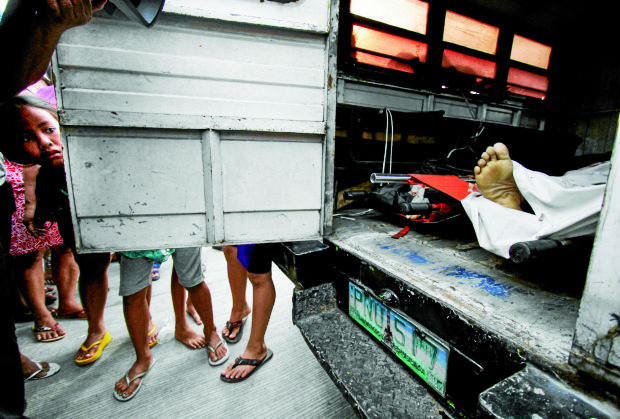CHR backtracks on statement clearing state in drug killings

3 DEAD IN QC A police vehicle carries the bodies of two men and a woman who were killed by masked gunmen inside a shanty in Quezon City. —RICHARD A. REYES
The Commission on Human Rights (CHR) appeared to have backtracked on a statement given this week by one of its officials that drug-related extrajudicial killings (EJKs) were not state-sponsored.
CHR Commissioners Gwen Pimentel-Gana and Roberto Cadiz said it was “premature” to make a conclusion since the commission had not completed investigating 463 EJK cases of interest out of the thousand cases after President Duterte was elected last year.
“The Task Force on EJKs called for an end to speculations whether all or some of the cases are state-sponsored, until every case is resolved,” the CHR said in a statement issued on Tuesday.
This was a day after Gana, head of the CHR task force looking into extrajudicial killings under the Duterte administration, told reporters that the commission did not say that the spate of drug-related EJKs were state-sponsored.
No such finding
Article continues after this advertisement“We never said that it was state-sponsored at all. There is no such finding that we can conclude that way. But what we can say is that the killings are still continuing and in an apparent vigilante manner (by) unknown assailants, so this is a police matter and they should be attending to this right away,” she had told reporters on Monday.
Article continues after this advertisementGana the next day issued a statement saying it was “premature for the CHR to draw any conclusion” since it was still investigating.
“Our work at the CHR in investigating EJK cases nationwide continues, with impartiality and truth as our guiding light, and at a more opportune time, we shall come out with a more comprehensive and complete report on the EJK cases referred to the task force,” she said.
Gana has said the task force will complete the investigation in April, and release its report in May.
‘Misunderstood’
In a separate statement, Cadiz said Gana “may have been misunderstood.”
“Our investigations are still ongoing. Thus we cannot yet conclude that the extrajudicial killings of drug suspects are state-sponsored. Conversely, we also cannot yet conclude that the administration is not engaged in state-sponsored killings,” he said.
He shared Gana’s view that one cannot expect to find a written government policy ordering extrajudicial killings of suspected drug pushers and users.
But Cadiz disagreed with Gana who had said that the President’s statements defending the antidrug campaign death toll was not proof that the state was behind the killings.
Cadiz said such state policy may be established “circumstantially,” citing his observation that the President “has never denounced any of the extrajudicial killings.”
“His rhetoric inciting the killings continue unabated. And instead of forceful directives to hold erring policemen accountable, (he made) statements assuring the police of his protection should cases be filed against them for abuses,” he said.
Cadiz added that the CHR would assess other official pronouncements, pointing out that Philippine National Police Director General Ronald dela Rosa had “on several occasions echoed the President’s statements exhorting the PNP to kill drug suspects.”
Cadiz went on to point out the failure of government officials to hold to account those responsible for extrajudicial killings.